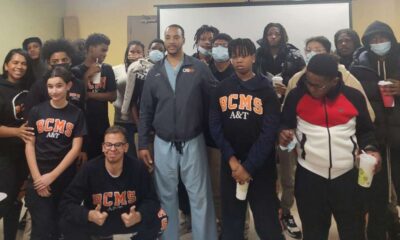Women's Matters
Black Women at Higher Risk of Homicide Than Any Other Race of Women

By Mary Alice Miller
Azsia Johnson was shot in the head at close range in June 2022 as she pushed her baby in a stroller on the Upper East Side. After an investigation police arrested her ex-boyfriend Issac Argro, age 22, and charged him with murder and criminal possession of a weapon. Issac was the father of her three-month- old baby.
In October 2022, Danielle Parker (29) was shot in the neck outside her family’s apartment on Dumont Avenue in East New York. The shooting occurred after a series of texts from former tenants of Danielle’s mom that taunted Danielle to come outside. Danielle was on life support at Brookdale Hospital and pronounced dead six days later.
Danielle had a 4-year-old daughter at the time of the shooting.
These incidents are part of an epidemic of Black women killed by people they know.
According to the CDC, homicide is one of the leading causes of death for women aged 18 – 44. Nearly half of the victims are killed by a current or former intimate partner. Non-Hispanic Black women experience the highest rates of homicide. Over half of all homicides were intimate partner violence (IPV) related, and 11% of victims of IPV-related homicide experienced some form of violence in the month preceding their deaths, with argument and jealousy being common precipitating circumstances. 15% of reproductive-age victims were pregnant or up to six weeks postpartum.
In 2020, 1,821 Black women and girls were killed, an average of five each day, an increase of 33% over 2019. That was an additional 461 Black women and girls killed in 2020 compared to 2019, an increase of more than one additional killing per day. The largest number of homicides occurred in the Midwest, particularly in Wisconsin and Missouri. The COVID-19 shutdown made it difficult for victims to escape to domestic violence shelters. And anti-violence initiatives generally focus on Black men and boys, with an emphasis on how cops and robbers negatively impact their lives. The number of Black females shot and killed by their husbands, or intimate acquaintance was nearly four times as high as the total number murdered by male strangers using all weapons combined. In 2019, Black females accounted for 14 percent of the female population in the United States, while 28 percent of the females killed by males in single victim/single offender incidents where the race of the victim was known were Black.
A 2021 report from the Violence Policy Center found that Black women murdered by men are nearly always killed by someone they know, most commonly with a gun. Compared to a Black male, a Black female is far more likely to be killed by her spouse, an intimate acquaintance, or a family member than by a stranger. The vast majority of homicides of Black females murdered by males were not related to any other felony crime. Most often, Black females were killed by males in the course of an argument.
The lack of national attention on Black women and girls’ homicides prompted Rosa Page, a nurse in Arkansas, to form Black Femicide Prevention Coalition (formerly called Black Femicide U.S.) to document the Black women murdered and the circumstances surrounding their deaths. “Black Femicide Prevention Coalition was started because I felt there was a need to tell the stories of the scores of Black women who are killed within the community. Our murders are grossly overlooked by both the media and community at large,” said Page. “It is important that these women and girls are recognized because in today’s political climate, as well as before, the recognition that black women and girls are murdered in such high numbers is a reality that the community chooses to ignore. [Murders committed by] law enforcement are more media-worthy. The public needs to remember these women because their lives mattered too.”
“The disturbing trends that stand out to me are visibly pregnant women being murdered, as well as an increase in murder/suicides coupled with family annihilation,” Page said. “Family annihilation is when the perpetrator of the murder/ suicide decides to murder not only their partners or children and other family members. In doing so, entire generations are gone.”
Page believes Black women and girls’ homicides can be addressed through education, both of boys and girls. “Boys must be taught that they are not entitled to girls and to direct their [feelings] from rejection by talking to someone or learning effective coping techniques,” said Page. “For girls, they need to understand that physical or mental abuse is not a form of jealousy that shows love. This is toxic behavior, and they need to tell someone immediately. It is important that this is taught from early on so that this is not normalized as they get older for both genders.”
Page added, “I am passionate about this work because I see it both from a professional as well as personal viewpoint. As both a mother of four daughters and a nurse, I am constantly faced with the importance of teaching self-worth and undoing the toxic cultural teachings passed down through generations. Black women and girls must realize that it’s okay to put themselves first.”













